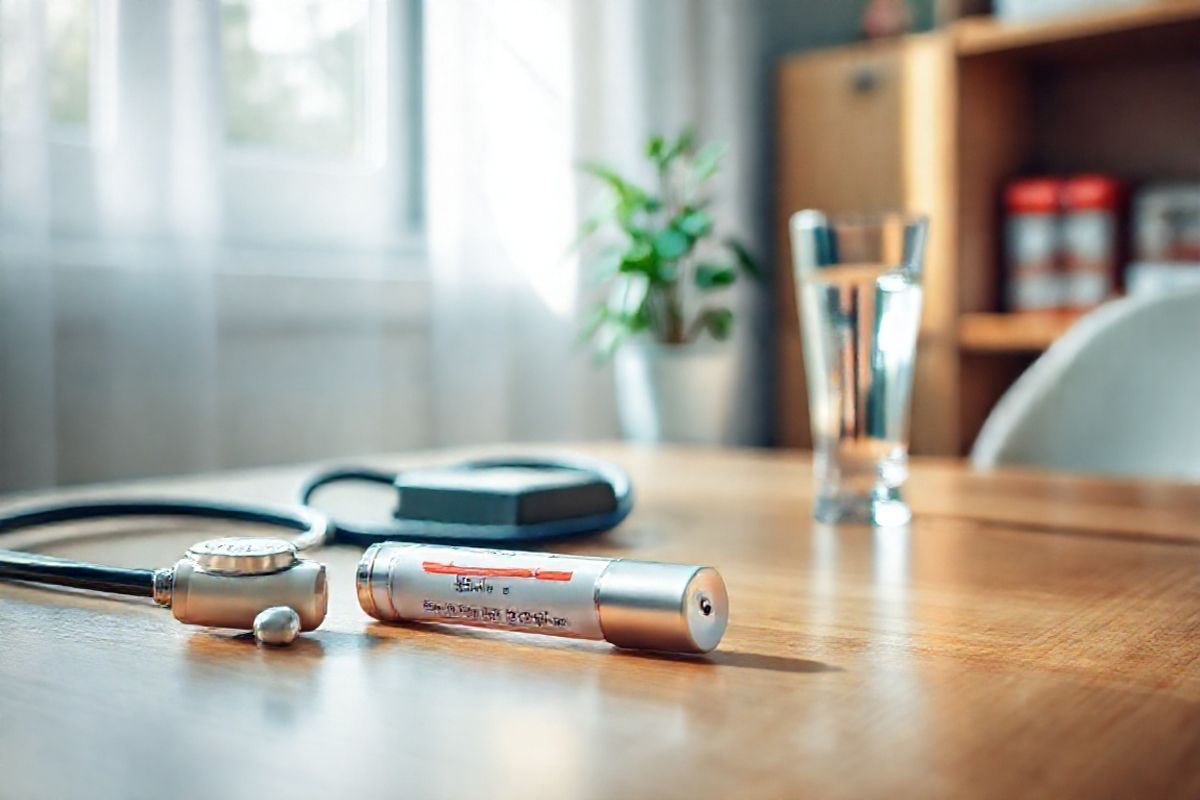Table of Contents
What is an EpiPen and How Does It Work?

An EpiPen is an auto-injector that delivers a pre-measured dose of epinephrine to treat anaphylaxis. The device is designed for easy use in emergencies, allowing individuals to quickly administer epinephrine when an allergic reaction is suspected. During anaphylaxis, the body releases large amounts of histamines and other chemicals that can cause symptoms such as swelling, difficulty breathing, rapid heartbeat, and a drop in blood pressure. Epinephrine works by reversing these effects: it narrows blood vessels, opens the airways, and increases heart rate, effectively alleviating the symptoms of anaphylaxis (Muraro et al., 2024).
Common Side Effects of Using an EpiPen: What to Expect

Using an EpiPen can lead to several side effects, some of which are mild while others can be more severe. Common side effects include:
-
Increased heart rate (tachycardia): Many individuals may experience a rapid heartbeat after epinephrine administration. This is a normal response as the medication stimulates the heart (Drug Side Effects Information on Over 5000 Medications, n.d.).
-
Elevated blood pressure: Epinephrine can cause a temporary increase in blood pressure, which can be concerning for individuals with pre-existing hypertension.
-
Nervousness or anxiety: Some people may feel jittery or anxious following the injection, as epinephrine stimulates the sympathetic nervous system.
-
Headache: This may occur as a result of increased blood flow and elevated blood pressure.
-
Dizziness or lightheadedness: These sensations can occur, particularly if the individual stands up too quickly after the injection.
-
Nausea or vomiting: Gastrointestinal upset is also a potential side effect.
Most side effects are transient and resolve as the effects of the medication wear off. However, it is essential to monitor for any signs of a severe allergic reaction or complications.
Recognizing Severe Reactions: When to Seek Medical Attention
While using an EpiPen is crucial in managing anaphylaxis, it is important to recognize when to seek further medical attention. Severe reactions can include:
-
Severe chest pain or tightness: This may indicate complications such as myocardial ischemia.
-
Difficulty breathing or wheezing: If symptoms do not improve after using the EpiPen, additional doses may be required, and emergency medical services should be contacted.
-
Persistent high blood pressure or tachycardia: Continuous monitoring is essential, as prolonged elevation can lead to cardiovascular complications.
-
Severe headache or vision changes: These could signify serious side effects related to blood pressure changes.
In all cases, individuals should go to the emergency room after using an EpiPen, even if symptoms seem controlled, to ensure proper follow-up care (Shaker et al., 2020).
Tips for Managing EpiPen Side Effects Effectively
Managing EpiPen side effects can be done effectively with the following strategies:
-
Stay calm: Anxiety can worsen symptoms. Practicing relaxation techniques prior to an allergic reaction can help.
-
Monitor vital signs: If possible, keep track of heart rate and blood pressure after using an EpiPen.
-
Hydrate: Drinking fluids can help mitigate some gastrointestinal side effects like nausea.
-
Rest: Allowing the body to recover by resting can alleviate some side effects.
-
Educate your support network: Ensure that family and friends understand how to use an EpiPen and recognize the symptoms of anaphylaxis.
The Importance of Educating Yourself and Others About EpiPen Use
Education is paramount in effectively managing the risks associated with allergies and anaphylaxis. Here are some key points to consider when educating yourself and others:
-
Understand how to use an EpiPen: Familiarize yourself with the device’s instructions. Practice using a trainer EpiPen if available.
-
Recognize triggers: Identifying allergens can help prevent anaphylactic reactions from occurring in the first place.
-
Create an emergency action plan: Having a written plan that outlines steps to take during an allergic reaction can be lifesaving.
-
Discuss with healthcare providers: Regular consultations with an allergist can help in understanding personal risks and management strategies.
-
Educate schools and workplaces: If you or your child has allergies, ensure that teachers and employers are aware of how to handle allergic reactions.
FAQ
What should I do if I experience side effects after using my EpiPen?
If you experience side effects, monitor your symptoms closely. Most side effects are temporary, but if you have severe symptoms, seek medical attention immediately.
Can I use my EpiPen more than once?
Yes, if symptoms do not improve after the first dose, a second dose may be administered. However, always seek emergency medical help after using an EpiPen.
How should I store my EpiPen?
EpiPens should be stored at room temperature, away from direct sunlight and extreme temperatures. Always check the expiration date.
Is it safe to use an EpiPen on someone else?
If someone is experiencing anaphylaxis and you are trained to use an EpiPen, it is safe to administer it. Always seek medical assistance afterward.
Are there any contraindications for using an EpiPen?
While EpiPens are generally safe for most individuals, those with certain heart conditions should consult their healthcare provider for personalized advice.
References
-
Muraro, A., de Silva, D., Podesta, M., et al. (2024). 10 practical priorities to prevent and manage serious allergic reactions: GA2LEN ANACare and EFA Anaphylaxis Manifesto. Clinical and Translational allergy
-
Drug Side Effects Information on Over 5000 Medications. (n.d.). Drugs.com. https://www.drugs.com/sfx/
-
Shaker, M., Wallace, D. V., Golden, D. B. K., et al. (2020). Anaphylaxis - a 2020 practice parameter update, systematic review, and Grading of Recommendations, Assessment, Development and Evaluation (GRADE) analysis. Journal of Allergy and Clinical Immunology. https://doi.org/10.1016/j.jaci.2020.01.017











